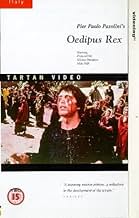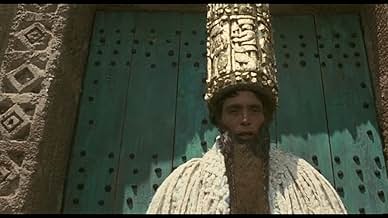IMDb RATING
7.2/10
7.1K
YOUR RATING
Rescued from abandonment and raised by the King and Queen, Oedipus is still haunted by a prophecy--he'll murder his father and marry his mother.Rescued from abandonment and raised by the King and Queen, Oedipus is still haunted by a prophecy--he'll murder his father and marry his mother.Rescued from abandonment and raised by the King and Queen, Oedipus is still haunted by a prophecy--he'll murder his father and marry his mother.
- Awards
- 4 wins & 4 nominations
Giovanni Ivan Scratuglia
- Sacerdote
- (as Ivan Scratuglia)
Laura Betti
- Jocasta's Maid
- (uncredited)
Pier Paolo Pasolini
- High Priest
- (uncredited)
Isabel Ruth
- Jocasta's Maid with a Lamb
- (uncredited)
- Director
- Writers
- All cast & crew
- Production, box office & more at IMDbPro
Storyline
Did you know
- TriviaFirst part of Pier Paolo Pasolini's "Mythical Cycle" also including Teorema (1968), Pigsty (1969) and Medea (1969).
- ConnectionsEdited into Days of Nietzsche in Turin (2001)
Featured review
Another marvelous film by Pasolini.
No one is as cinematically intense as this man, but it's not an ordinary intensity he affects. It does not result from the withholding of narrative or visual information, it is not primarily a dramatic intensity; Lean, Hitchcock, Kurosawa, all did some terrific work in that external mode where we see the struggling human being in the cleanly revealed world of choices and fates.
Pasolini works his way around all that, starting with one of the most archetypal stories. Here we have anticipation, foreknowledge as fate. And of course there is some dramatic intensity in this and others of his films, but that's not what makes him special. He can create heightened worlds that we experience with a real intensity. It goes back to that film movement called Neorealism which thrived in postwar Italy, where the utmost goal was to soak up a more human, more universal conflict as we staggered through broken pieces of the world.
Looking back now it seems stale, we have a much more refined sense of what is real, we can see the conceit of the camera. But two filmmakers emerged from out of this movement who did work in a more radical direction, moving the images closer to perception.
Antonioni is one of the greatest adventures in film. Pasolini is the other. The larger point with him is to have an intensely spiritual experience of a whole new storyworld, to that effect he selects myths that we have more or less fixed notions about how they should be (this, Medea, his Gospel film) and films them to have invigorating presence in the now.
Every artistic choice in the film reflects that; the dresses, the swords, the landscapes, the faces, it's all intensely unusual to what you'd expect from Greek myth, seemingly handcarved to be from a preconscious world outside maps and time. The camera also reflects that; he could have plainly asked of a fixed camera and smooth, fixed traveling shots from his crew, but evidently he wants that warm lull of the human hand. It's a different sort of beauty, not in some painted image but in our placement in evocative space.
When Oedipus visits the oracle at Delphii, we do not have sweeping shots of some ornate marble structure as you'd expect in a Hollywood film. A congregation of dustcaked villagers is gathered in a clearing before a group of trees, the oracle is a frightening old crone attended by slender boys in masks. The roads are dusty, interminable ribbons dropped by absent-minded gods. A Berber village in Morocco stands for ancient Thebes. Sudden dances. Silvana Mangano. And those headgear! It's all about extraordinariness in the sense of moving beyond inherited limits of truth.
It works. This is a world of divinity, causal belief, and blind seeing into truth that even though it was fated, we discover anew in the sands.
The sequence where a feverish Oedipus confronts his father at the crossroads will stay with me for a long time, the running, the sun, the distance where tethers are pulled taut.
No one is as cinematically intense as this man, but it's not an ordinary intensity he affects. It does not result from the withholding of narrative or visual information, it is not primarily a dramatic intensity; Lean, Hitchcock, Kurosawa, all did some terrific work in that external mode where we see the struggling human being in the cleanly revealed world of choices and fates.
Pasolini works his way around all that, starting with one of the most archetypal stories. Here we have anticipation, foreknowledge as fate. And of course there is some dramatic intensity in this and others of his films, but that's not what makes him special. He can create heightened worlds that we experience with a real intensity. It goes back to that film movement called Neorealism which thrived in postwar Italy, where the utmost goal was to soak up a more human, more universal conflict as we staggered through broken pieces of the world.
Looking back now it seems stale, we have a much more refined sense of what is real, we can see the conceit of the camera. But two filmmakers emerged from out of this movement who did work in a more radical direction, moving the images closer to perception.
Antonioni is one of the greatest adventures in film. Pasolini is the other. The larger point with him is to have an intensely spiritual experience of a whole new storyworld, to that effect he selects myths that we have more or less fixed notions about how they should be (this, Medea, his Gospel film) and films them to have invigorating presence in the now.
Every artistic choice in the film reflects that; the dresses, the swords, the landscapes, the faces, it's all intensely unusual to what you'd expect from Greek myth, seemingly handcarved to be from a preconscious world outside maps and time. The camera also reflects that; he could have plainly asked of a fixed camera and smooth, fixed traveling shots from his crew, but evidently he wants that warm lull of the human hand. It's a different sort of beauty, not in some painted image but in our placement in evocative space.
When Oedipus visits the oracle at Delphii, we do not have sweeping shots of some ornate marble structure as you'd expect in a Hollywood film. A congregation of dustcaked villagers is gathered in a clearing before a group of trees, the oracle is a frightening old crone attended by slender boys in masks. The roads are dusty, interminable ribbons dropped by absent-minded gods. A Berber village in Morocco stands for ancient Thebes. Sudden dances. Silvana Mangano. And those headgear! It's all about extraordinariness in the sense of moving beyond inherited limits of truth.
It works. This is a world of divinity, causal belief, and blind seeing into truth that even though it was fated, we discover anew in the sands.
The sequence where a feverish Oedipus confronts his father at the crossroads will stay with me for a long time, the running, the sun, the distance where tethers are pulled taut.
- chaos-rampant
- Jul 6, 2013
- Permalink
- How long is Oedipus Rex?Powered by Alexa
Details
Box office
- Gross worldwide
- $2,364
- Runtime1 hour 44 minutes
- Aspect ratio
- 1.85 : 1
Contribute to this page
Suggest an edit or add missing content


































